Ecobank Group H1 2025 Result: Pan Regional Growth Pulls PBT Up by +39.85%
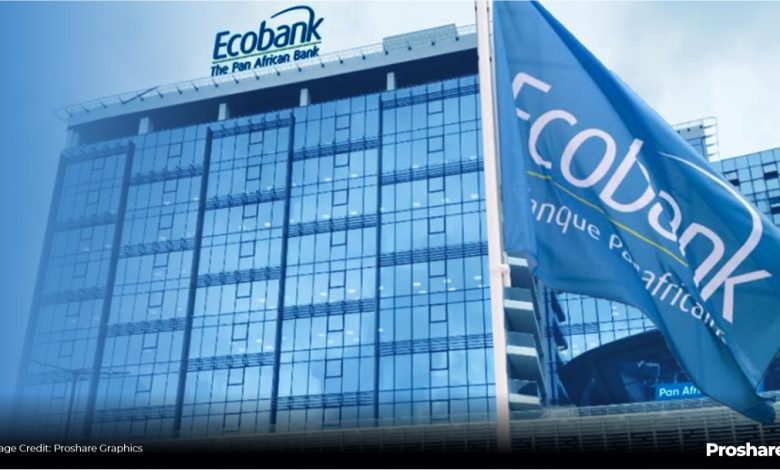

Regional performances improved gross earnings, profitability and bottom-line profit of the group. These gains were supported by improved operational efficiency (cost-to-income ratio declined), solid deposit growth, and digitally driven customer engagement, even as credit impairments increased amid cautious risk provisioning.
In Nigeria, where Ecobank operates in one of its most challenging yet promising markets, macroeconomic conditions remained volatile in H1 2025. The Central Bank’s sustained tight monetary policy stance, ongoing FX reforms, and persistent inflation created a less favourable environment for both consumers and corporates. Despite these headwinds, Ecobank Nigeria capitalised on improved foreign exchange liquidity, increased trade volumes, and expanded digital banking penetration to achieve a strong earnings recovery.
The group’s performance not only reflects effective balance sheet optimisation and strategic discipline but also shows that, across Africa, financial institutions with regional reach and agile risk frameworks can perform well even in high-friction environments. As ETI continues to deepen its cross-border banking services and strengthen its digital ecosystem, it stands out as a key indicator of Africa’s evolving financial resilience. (see Table 1 below).
Table 1:
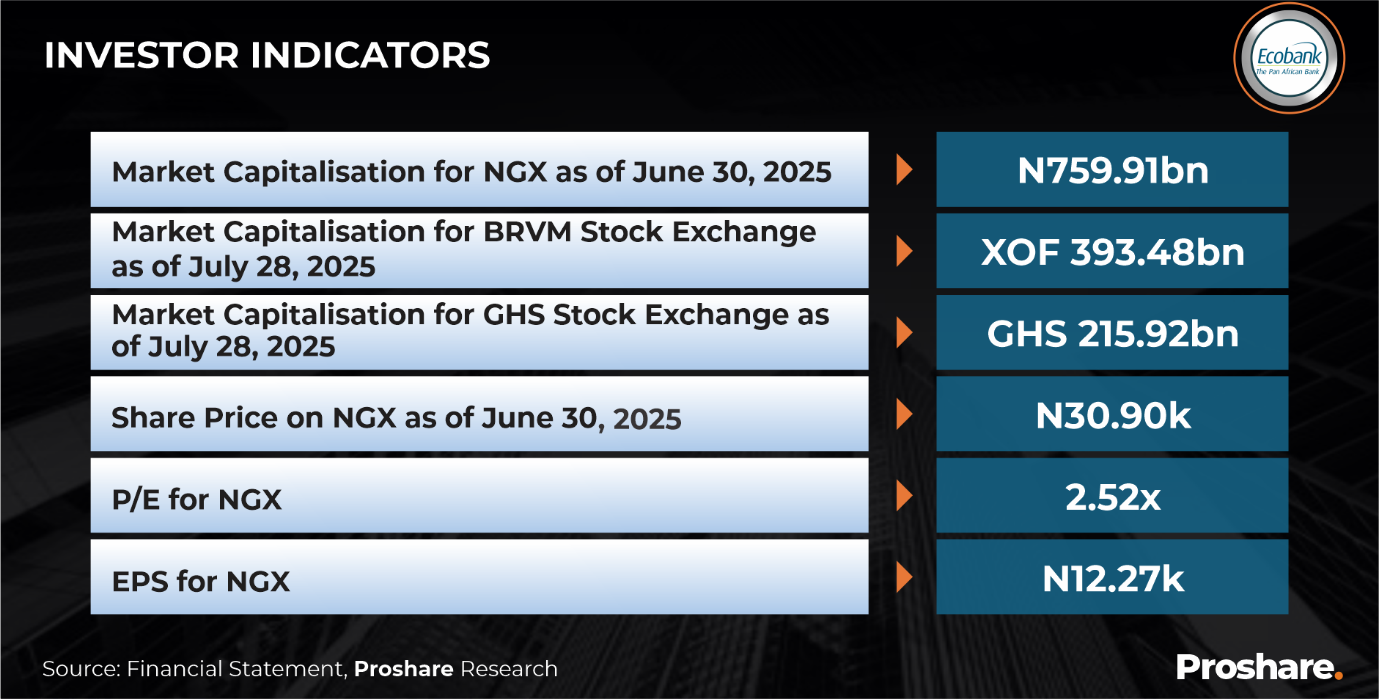
Key Highlights H1 2025
- The group’s gross earnings rose by +23.71% to N2.31trn in H1 2025 from N1.86trn in H1 2024.
- Operating income increased by +27.76% from N1.36trn in H1 2024 to N1.74trn in H1 2025, while operating expenses rose by +17.14% to N853.65bn in H1 2025 from N728.73bn in H1 2024.
- Profit before tax rose by +39.85% to N620.23bn in H1 2025 from N443.51bn in H1 2025, while profit after tax increased by +39.68% from N311.02bn in H1 2025 to N433.88bn in H1 2025.
- Total assets increased by +27.18% from N38.60trn in H1 2024 to N49.09trn in H1 2025, driven by increases in loans and advances, investment securities, and cash and balance with the CBN.
- ETI’s combined loans and advances to customers rose by +19.31% to N21.42trn in H1 2025 from N17.95trn in H1 2024, with loans and advances from customers accounting for 78.73% of the total loans and advances in H1 2025.
- Customers’ deposits increased by +29.38% from N28.26trn in H1 2024 to N36.56trn in H1 2025.
- Retained earnings rose by +104.61% to N2.08trn in H1 2025 from N1.02trn in H1 2024, pushing shareholders’ value up by +61.07% to N3.62trn in H1 2025 from N1.25trn in H1 2025.
- Earnings per share increased to N12.27 in H1 2025 from N8.78 in H1 2025.
Key Highlights Q2 2025
- Interest income rose by +28.07% to N794.03bn in Q2 2025 from N620.02bn inQ2 2024, while interest expense increased by +11.73% from N244.91bn in Q2 2024 to N273.63bn in Q2 2025.
- Net interest income increased by +38.73% to N520.40bn in Q2 2025 from NN372.11bn in Q2 2024.
- ETI’s non-interest revenue grew by +34.17% from N375.11bn in Q2 2024 to N319.59bn in Q2 2025.
- Operating income rose by +36.63% to N949.19bn in Q2 20205 from N694.70bn in Q2 2024, while operating expenses increased by +20.45% from N370.76bn in Q2 2024 to N446.59bn in Q2 2025.
- The pre-tax and post-tax profits increased by +45.86% and +46.31% to N352.93bn and N248.77bn in Q2 2025, respectively.
- Net fees and commission income grew by +29.37% from N180.73bn in Q2 2024 to N233.80bn in Q2 2025
Gross Earnings
ETI’s performance in H1 2025 demonstrated resilience in the group’s diversification business strategy across Africa and its Growth, Transformation and Returns (GTR) strategy. The top-line earnings grew by +23.71% to N2.31trn in H1 2025 from N1.86trn in H1 2024, leveraging interest and non-interest income. Increases in loans and advances to customers, investment securities and treasury bills accounted for a +21.18% growth in interest income from N1.22trn in H1 2024 to N1.49trn in H1 2025. Additionally, the non-interest income grew by +27.96% to N766.14bn in H1 2025 from N598.76bn in H1 2024, driven by growth in foreign exchange gains (+27.68%) and net fees and commissions (+25.33%).
In terms of dollars, the group’s corporate & investment banking and consumer and commercial banking generated US$578m and US$573m in net revenue. Gross earnings grew by +8.77% from US$1.36trn in H1 2024 to US$1.48trn in H1 2025, driven by stability in foreign exchange (see Chart 1 below).
Chart 1:
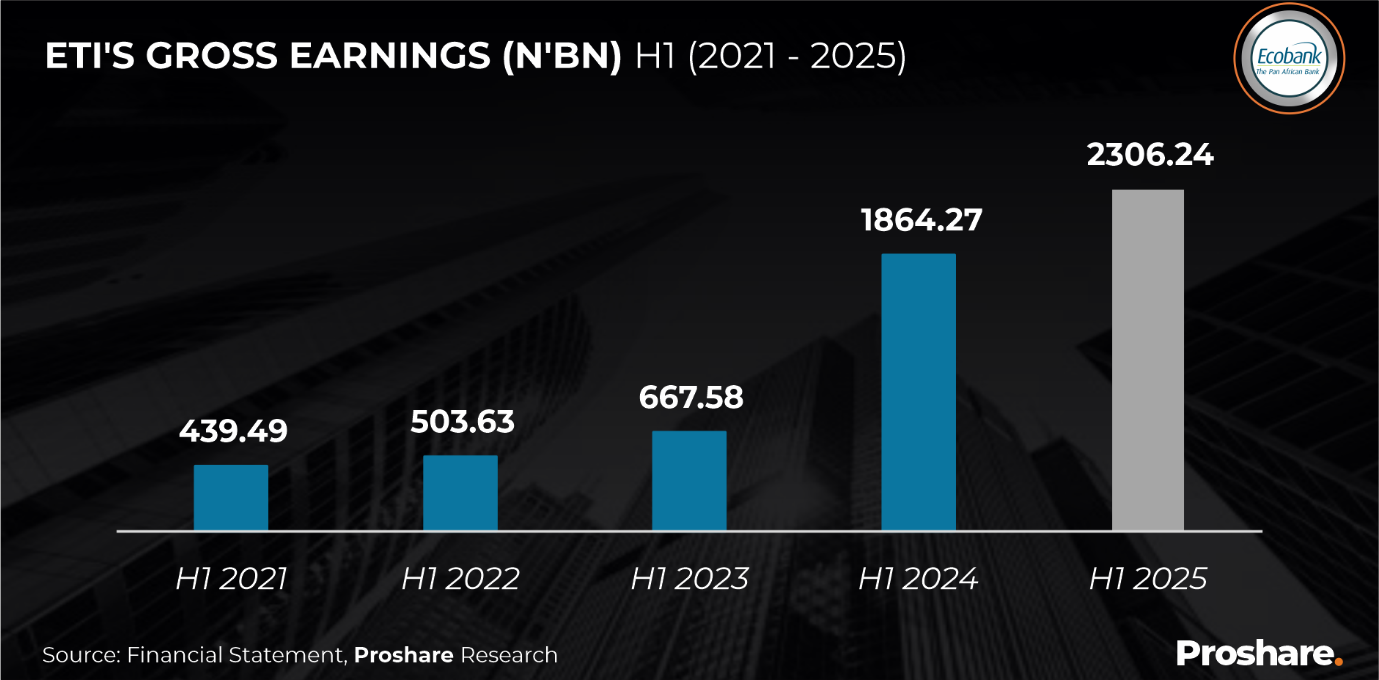
Profitability
The group’s profit before tax (PBT) and profit after tax (PAT) rose +39.85% and +39.50% to N620.23bn and N433.88bn, respectively, in H1 2025 despite the higher operating expenses. In dollar terms, the group’s pre- and post-tax profits grew by +22.960% and +22.65% to US$398.50m and US$278.77m, respectively. Analysts expect the group’s profitability growth to persist in the remaining quarters (see Chart 2 below).
Chart 2:
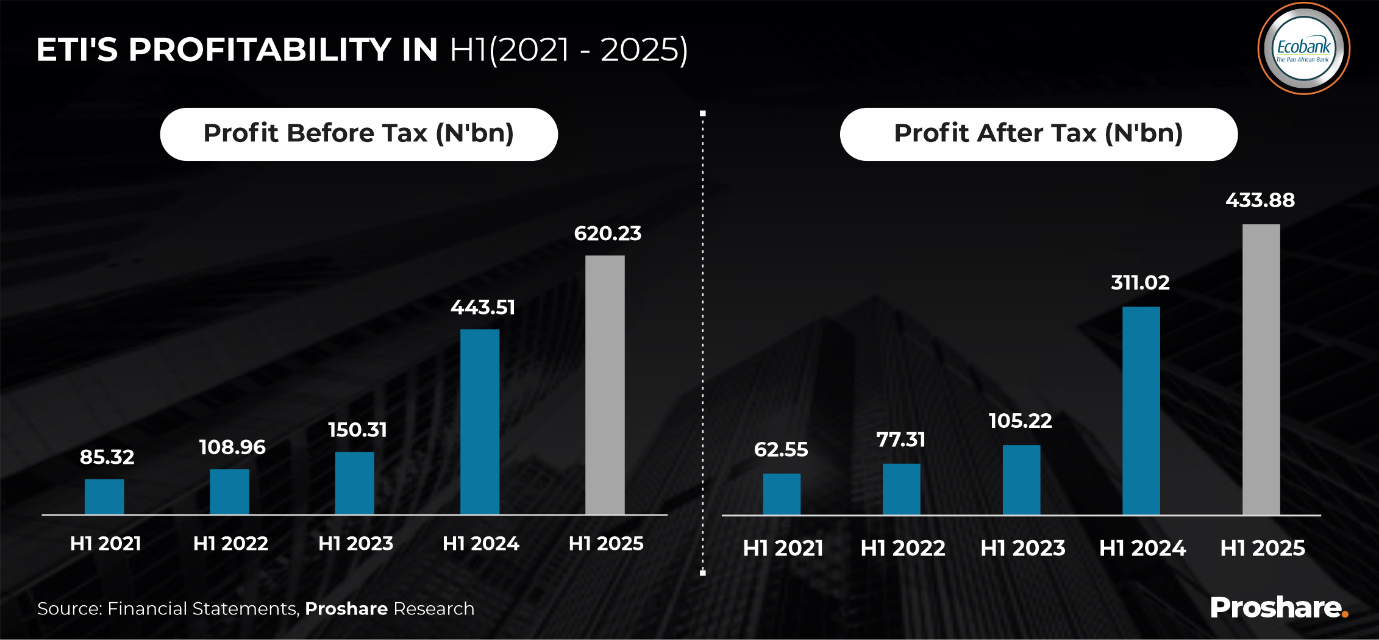
Financial Position
Driven by growth in investment securities (+32.20%), and loans and advances (+19.31%), the ETI’s financial position grew +27.18% to N49.09trn in H1 2025 from N38.60trn in H1 2024. In dollar terms, ETI’s total assets grew by +23.44% from US$25.93bn in H1 2024 to US$32.01bn in H1 2025. The stability in the macroeconomic and continuous CBN’s interventions in the FX market improved international transactions of the bank, and analysts expect this to persist in the remaining quarters of the year. Retained earnings pushed shareholders’ value by +61.07% from N2.24trn in H1 2024 to N3.62trn in H1 2025. Deposits from customers rose by +29.38% from N28.26trn in H1 2024 to N36.56trn in H1 2025 (see Table 2 below).
Table 2:
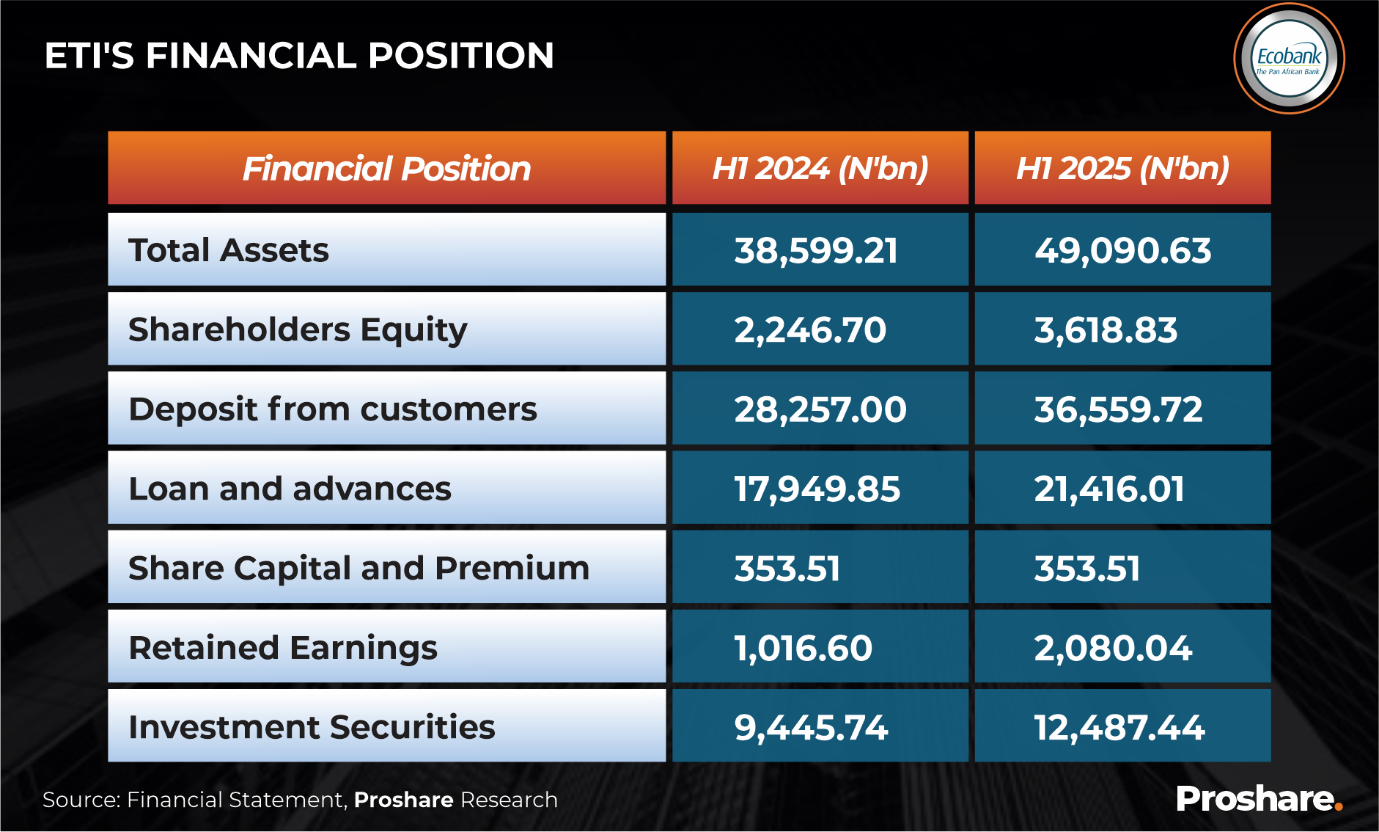
Financial Ratios
The Pan-African bank’s financial ratios improved in H1 2025 as increased profitability drove the return on assets and net interest margin to 1.90% and 5.60%, respectively. The slower rise in operational cost (+17.14%) relative to revenue (+27.76%) pushed down the cost-to-income ratio to its lowest, 47.10% in H1 2025, showing efficiency in cost minimisation. The high-risk nature of the banking environment heightened the cost of risk to 2.21% in H1 2025 from 2.21% in H1 2024, while the nonperforming loan ratio declined to 5.60% in H1 2025 (see Table 3 below).
Table 3:
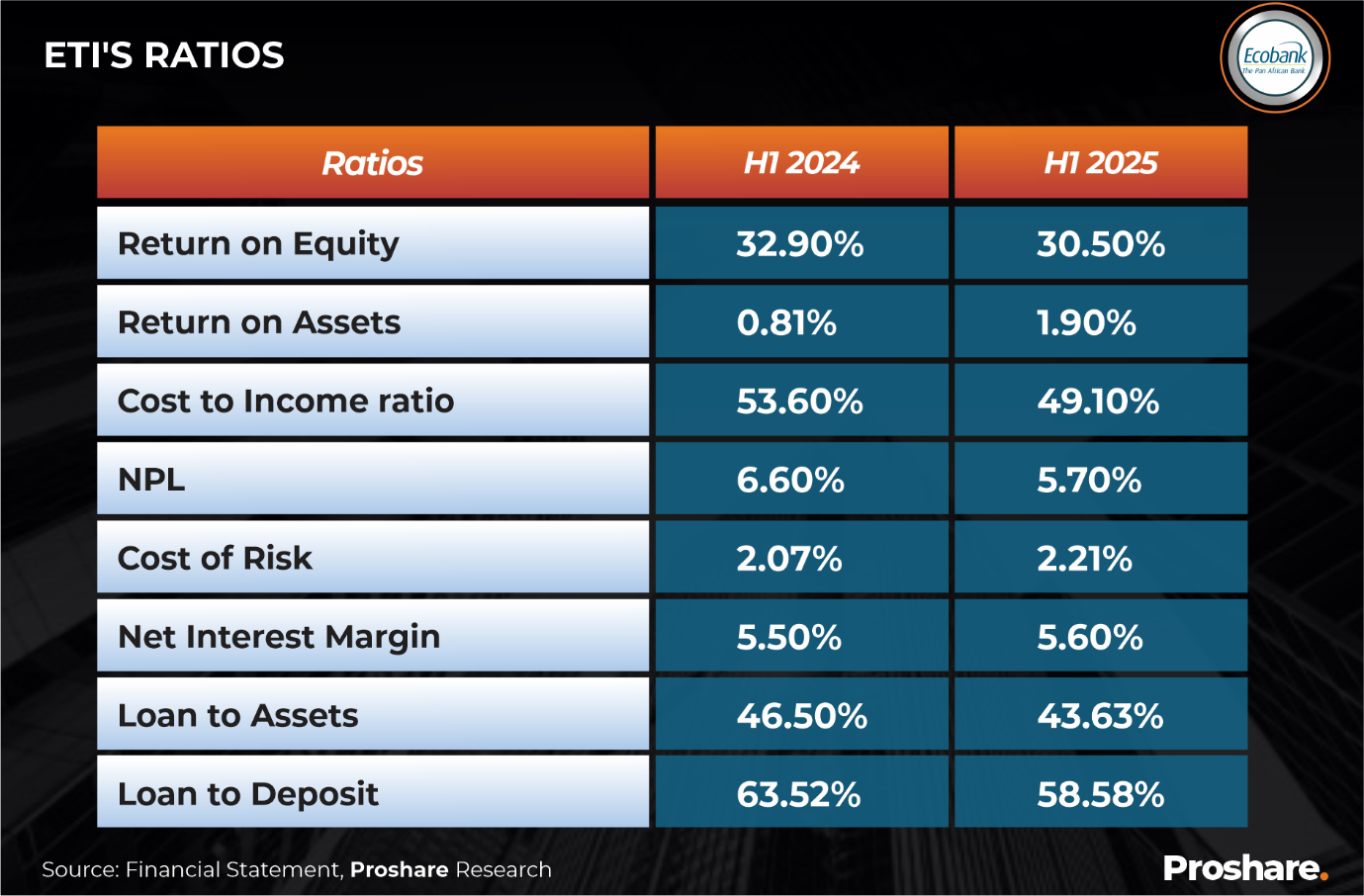
Valuation
Growth in ETI’s share price on the NGX relative to its earnings per share rose the Pan-African bank’s price-to-earnings to 2.52x in H1 2025 from 2.43x in H1 2024. Increased profits recorded during the period under review grew the group’s book value, resulting in a fall in the price-to-book value from 0.23x in H1 2024 to 0.21x in H1 2025. The NGX share price revealed that the bank is priced below its book value, implying investors’ pessimism in the stock of the group (see Table 4 below).
Table 4:
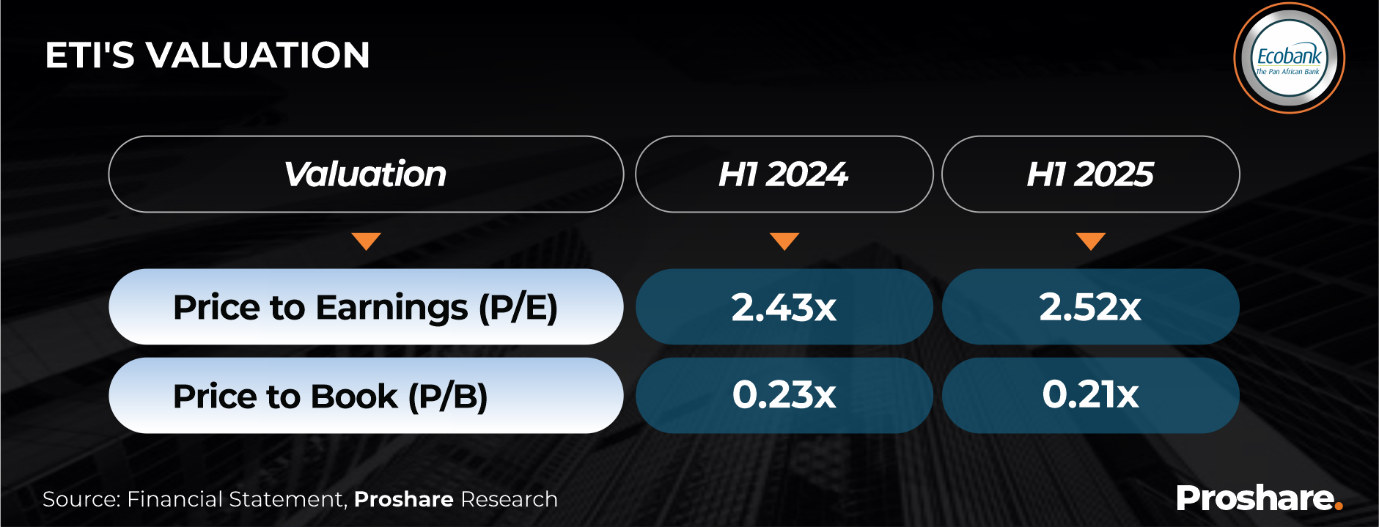
Share Price Movement
ETI’s share price on the NGX experienced some periods of flatness with high fluctuations in H1 2025. After a period of flats, the share price rose sharply from N28.00k on January 8, 2025, and became steady at N30.40k from January 9, 2025, through February 5, 2025, then rose thereafter. Amid various dips and steadiness, the sharp price reached its lowest of N23.50k on May 5, 2025, and then consistently rose slightly. By the end of June, the share price reached N30.90k and then settled at N34.00k by July 28, 2025, with an average share price of N30.48k in H1 2025 (see Chart 3).
Chart 3:
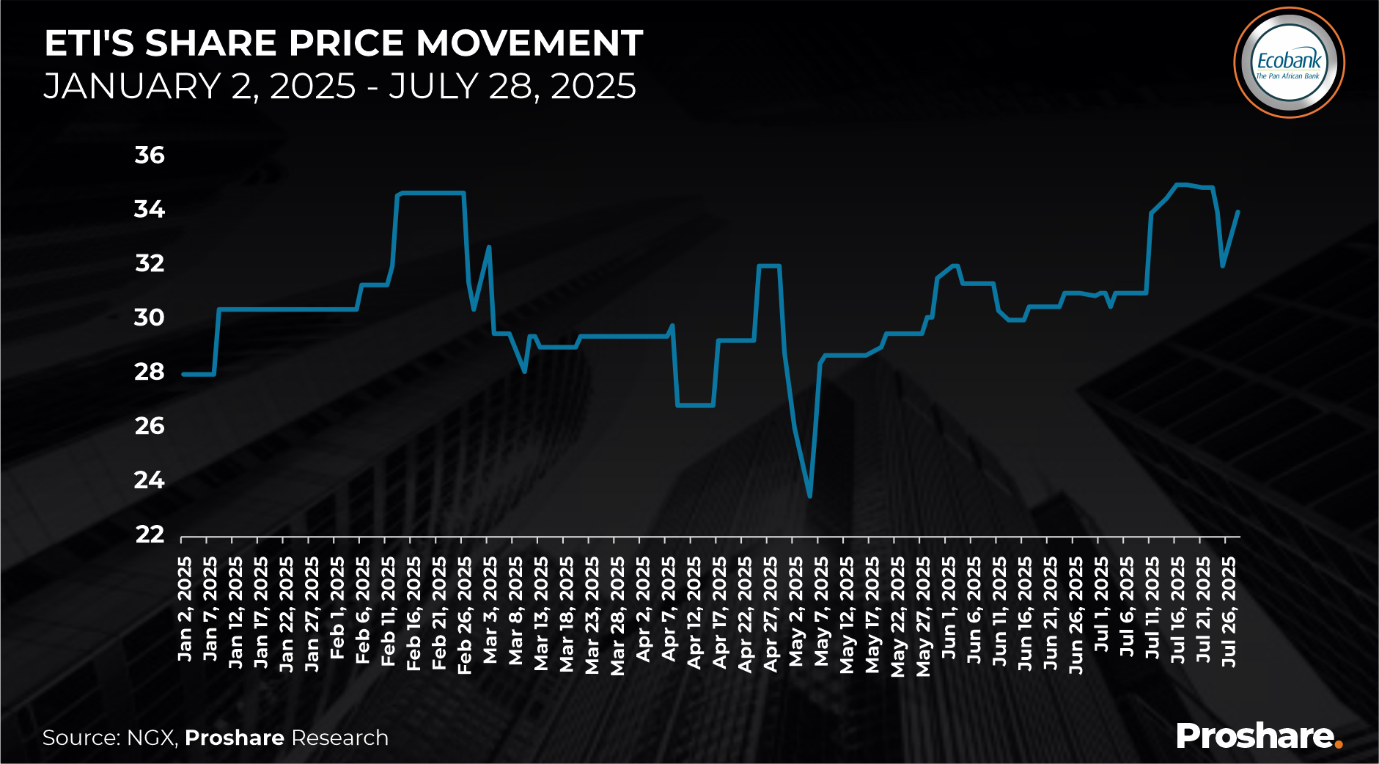
ETI’s Regional Performance of ETI H1 2025: Improved Operations Across Areas
ETI’s strong presence in African countries boosted its solid performance in H1 2025. All regions showed growth compared to H1 2024, achieving strong metrics. Regional profitability was balanced: Francophone West Africa (UMEOA) earned US$176m, Anglophone West Africa (AWA) earned US$175m, benefiting from Ghana’s recovery; Nigeria, the largest market, grew by 45% year-on-year; and Central, Eastern & Southern Africa (CESA) contributed US$207m.
Nigeria’s recovery offsets previous macroeconomic pressures, while CESA continues to expand steadily as disciplined pricing and digital investments support fee income across regions. Despite a sharp rise in impairments, the group’s improved asset quality reduced NPL ratios across the areas. Analysts believe ETI’s regional strength highlights its diversified footprint and anticipate that the Pan-African bank will mirror this performance in the upcoming quarters of the year. (see Illustration 1).
Illustration 1:
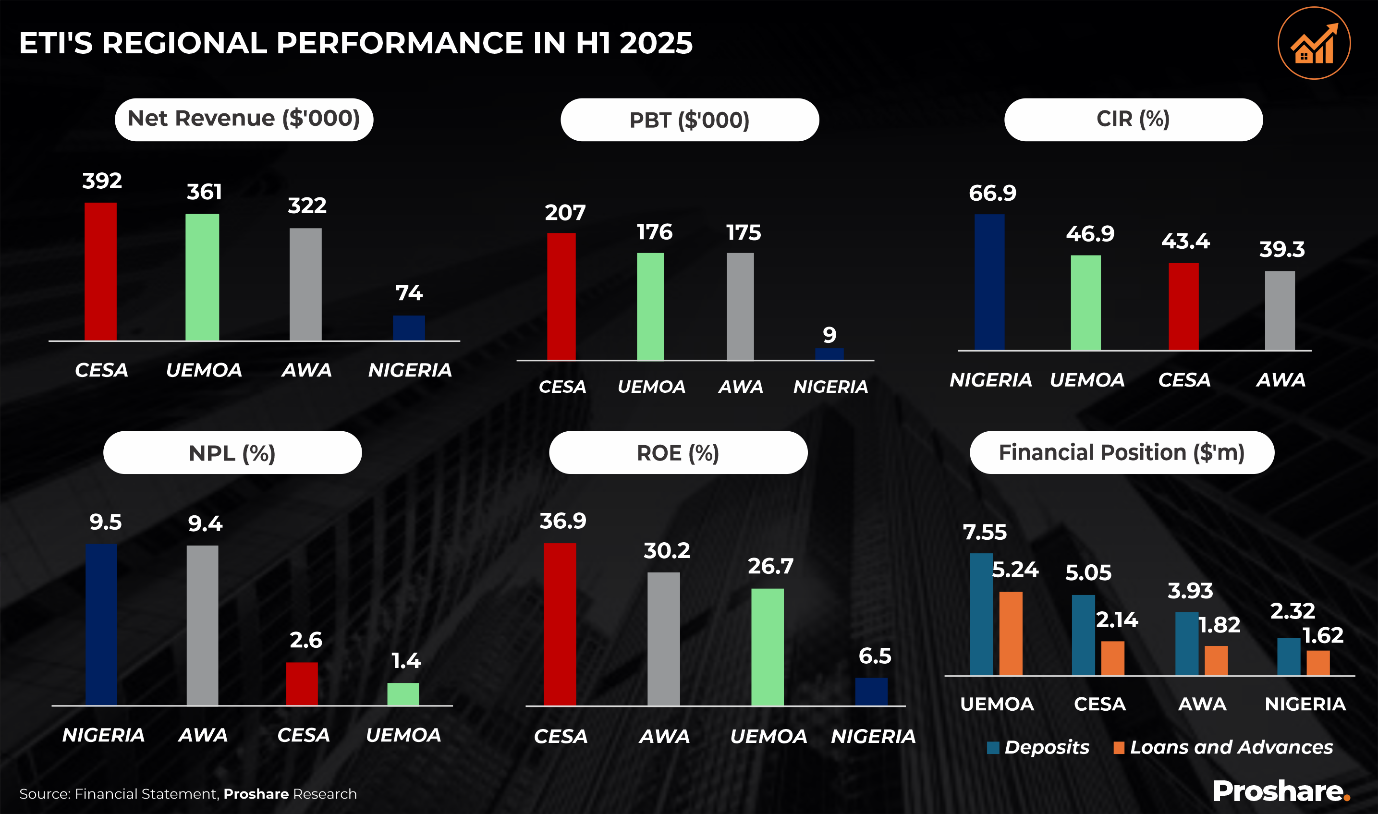
Closing Thoughts
Ecobank Group’s performance in H1 2025 was spurred by regional diversification, operational efficiency, cost minimisation and improved FX positions across its markets. The notable recovery in Nigeria, steady gains in CESA, and the consistent contributions from Anglophone and Francophone West Africa reinforced the Group’s pan-African credentials and prudent risk management. Analysts believe the bank is set to sustain momentum in the last two quarters of 2025, buoyed by growing non-interest income, deepening digital footprint and stable deposit growth. However, uncertainties around inflationary trend, FX volatility and asset quality remain an issue of concern.




